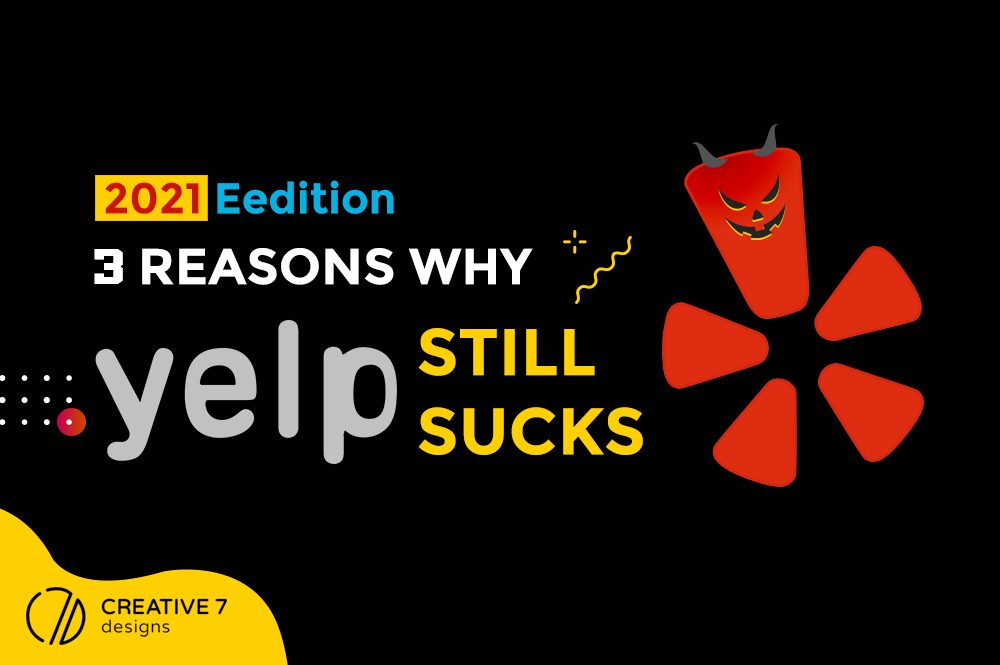OVERVIEW: Yelp might be the “review guru” for consumers, but it seems to invite more harm than help to business owners
Since 2018 we’ve experienced firsthand how Yelp isn’t the best review platform. Turns out, it’s unreliable, biased, and hides reviews without consent… who would’ve thunk it! (Though we can’t say we’re entirely surprised.)
If you’re a small business owner, you’re probably familiar with Yelp at this point. It has over 115 million total reviews and 145 million monthly users and is the go-to for receiving insight on local businesses.
It acts as the neighborhood foodie, businessman, auto expert, socialite, and everything in between and has become the first place potential customers turn to for trusted information about a new retail store, restaurant, or service. Except… it isn’t as trusted as business owners need it to be.
Though Yelp helps consumers like you and me make purchasing decisions, our company hasn’t been the biggest fans of the review platform over the last couple of years. So, why don’t we like Yelp?
Yelp encourages businesses to adopt an unhealthy yes-man approach
Vanishing reviews (need we say more?)
Lack of action taken for hidden positive reviews; inaccurate action taken for negative reviews
Let’s get into the specifics of why Yelp doesn’t help small businesses the way we need it to.
1. YELP ENCOURAGES A YES-MAN APPROACH RATHER THAN MUTUAL ENGAGEMENT
Though Yelp is meant to improve businesses, it encourages (almost coerces) us to adopt a yes-man approach to handling customers rather than establishing a constructive, mutual engagement.
And this is all at the cost of low-wage employees’ wellbeing. What do we mean by this?
Let’s take a look at this account where an employee had to “act” nicely to a rude customer just to maintain positive Yelp reviews:
A mom (with her kids) cussed me (17-year-old me) out because I had to ID her for using a card, but she left her ID in the car. It was a business policy that I would have gotten in trouble for [sic] if I gave her an exception.
Employee or not, people shouldn’t have to remain stoic when experiencing verbal abuse from anyone. Not for the sake of a paycheck. And definitely for the sake of a positive review.
This general principle shouldn’t be ignored just because someone is on-the-clock.
We need to do better as consumers and employers. We need to establish rules for team member interactions, customer interactions with one another, and the cross-interaction between team members and customers.
And we certainly need to discuss healthy ways to handle situations when faced with a disgruntled customer. But simply acting as the punching bag isn’t it.
When I used to work in retail management, one customer misread a promotional sign. They ended up yelling at one of my associates because they misread the clearly-marked sign and the associate wouldn’t grant their request to discount the price based on what they misread.
While my associate was one of my most poised team members and kept their calm during that interaction, I didn’t want to send the message to others that this was OK. Because it wasn’t.
So as soon as I noticed this interaction, I walked over to my associate, excused them to take a breather and complete another task away from that area, and took over the transaction.
At the end of the day, our employees aren’t getting paid to be verbal punching bags. Granted, the territory of customer service is brutal, exhausting, and unfair at times. But in no way does working in any customer service field warrant disrespect from either end.
So what’s the connection/issue with Yelp? It offers a way for business owners to reply, but suggests that owners stick to the “customer is always right” principle.
The result? Business owners bend over backwards for Yelp reviewers — even if the Yelp reviewers are wrong. And employees are left also bending over backwards, or just being the verbal punching bag, for wrongfully disgruntled customers for the sake of “no bad reviews.”
Speaking of reviews…
2. VANISHING REVIEWS
This is quite a no-brainer. But vanishing reviews? For a website that’s focused on reviews, you would think Yelp would do a better job at managing how reviews are presented to the public.
But this is more than just reviews vanishing.
Business owners have long complained of a negative review bias on Yelp, where angry and disgruntled customers are more likely to organically volunteer their thoughts than their satisfied counterparts. So, let’s talk about it.
a. Yelp relies on an (inaccurate) algorithm to decide what reviews to make public and not
Yelp uses an algorithm to remove false reviews and/or reviews that seem too good to be true. After all, rosy reviews may be the result of business owners posting their own positive reviews, friends and family reviewing, or businesses soliciting reviews from a behind-the-scenes email list or something. (Yes, this happens. I used to work for a company that had an email list dedicated to individuals who they would give free items to so long as they left a review. The catch? The review had to be positive.)
So, in an effort to supply real, honest reviews, Yelp filters some comments left by customers, even if the comments have been left by real customers. This leads to our next issue with Yelp.
b. Significant amounts of our “recommended” reviews on our Yelp business page (and that of our clients) have vanished over the years
Some of our reviews have vanished from Yelp. We know this already, that’s why we’re writing about this. According to Yelp, “the best word of mouth is organic and unsolicited,” which is what the algorithm mentioned above works to showcase. But, algorithms aren’t perfect.
The filter has been known to remove real, positive reviews left by actual customers. Yelp is aware of this issue, as they mentioned on their blog:
“Reviews that reflect perfectly legitimate experiences are sometimes filtered out by the review filter’s algorithmic processes. We agree this can be frustrating, but it’s the high cost we accept to avoid being a lassez-faire review site that people stop using.”
So what we’re seeing is: If it’s a positive review, Yelp doesn’t trust it. If it’s a negative review, Yelp trusts it. It’s like Yelp just can’t see the good in a business.
For a company that toots “Real People. Real Reviews,” you would think they would, I don’t know, figure out a way to showcase the realest reviews. It seems like they’ve got their processes backwards.
What determines a “real” review from a fake one… or a “real” person from a dishonest one?
While we understand that this is a tricky filtering process, it isn’t impossible. Just takes some tinkering and likely some hands-on work. Would we call the company lazy? No. But we wouldn’t let that by us.
3. NO ACTION TAKEN FOR HIDDEN POSITIVE REVIEWS
The good thing is that those reviews aren’t gone forever. They’re just “not recommended” (courtesy of euphemisms by Yelp).
Those positive reviews are essentially hidden from a business’s main profile — which isn’t really a win because they’re not easily accessible for consumers and are therefore likely to be overlooked.
And what’s Yelp doing about this? Nothing. Still.
a. Reaching out to Yelp about the loss or reviews has proven unsuccessful
If a Yelper leaves a review that’s filled with false accusations, a small business owner can report it to Yelp, but it’s unlikely that Yelp will take it down.
On Yelp’s support center, it provides a link to report “questionable reviews” but goes on to say, “We typically don’t take sides in factual disputes and generally allow Yelpers to stand behind their reviews.” Wait, what?
Statistics* show 72 percent of consumers trust Yelp as much as personal recommendations. With such a hefty influence, is it wrong that businesses want more control over their online reputations?
But rather than have dishonest reviews removed, business owners can respond in a professional manner in an effort to better represent their brand. If handled properly, cranky Yelpers can turn into repeat customers.
b. Things got worse for small business during the pandemic… thanks to Yelp
The Brownings, small business owners of a local restaurant, along with many other local restaurateurs, said bad reviews on Yelp added to their struggle during the pandemic.
The reason for the reviews? Customers were disgruntled as a result of county-ordered safety and service requirements that were beyond businesses’ control.
Roddy Browning said his efforts to have Yelp remove the most unfair and dishonest reviews has been unsuccessful.
Needless to say, our attempts to get Yelp to either remove unfair reviews or unhide honest, positive reviews was also to no avail. Even after all these years…
But, wait, there’s more! (Yes, it gets worse.)
c. Money in exchange for hidden negative reviews?
Do we really need to talk about Yelp’s extortion claims? Still? In 2021? I think we know the answer.
By now, it should be no surprise that Yelp has faced several class action lawsuits because of extortion claims.
So here’s the deal: Small businesses can advertise on Yelp — not without a charge, of course. However, some small businesses allege the company extorts owners by promising to hide negative reviews in exchange for advertising dollars.
Business owners have accused Yelp of extortion, claiming Yelp moves positive reviews to the top after a business pays to advertise.
For its part, Yelp routinely denies these claims. The company has even posted an article on its blog that says extortion claims are not, and never have been, true.
The post goes on to point out that research has debunked this myth and points to the number of times that courts have rejected the claims. But it doesn’t help when judges have dismissed the extortion cases, according to news sources.
And we’re not even going to get into the dodgy company “culture” that Yelp has been called out for in the past.
*according to research from Merchant Warehouse
IN CONCLUSION: YELP SUCKS
The truth is that as much as we want to love Yelp, we just can’t.
For too long, businesses across every industry has had to choose between the dignity of their team and the reputation of their company according to the public eye (which may or may not be an accurate representation).
We can no longer decide what’s worse:
Being a yes-man
Watching our positive reviews vanish while negative reviews soar
Bending over backwards for a company that schemes behind closed doors, so to speak
None of these reasons are good. All of them suck. And Yelp is still one of the most popular online review platforms.
So what does this say about us as consumers?
With paid marketing at an all-time high, it’s hard for consumers to know what reviews to trust.
We could do what one Yelper did and delete their account entirely after a nightmare experience with a questionable business owner, its questionable business practices and ethics, and Yelp’s questionably unresponsive reaction. But every business owner also knows how beneficial Yelp could be.
So when it comes to Yelp, it’s really a matter of choosing the lesser of 2 evils:
Stay on Yelp for exposure and run the risk of dishonest reviews ruining your business’s reputation.
Avoid Yelp at all costs but run the risk of having no online exposure for potential honest reviewers to draw in prospective customers.
As much as we dislike Yelp, we still have our account. We guess any exposure is better than none.
But, at the end of the day, the choice is yours.


